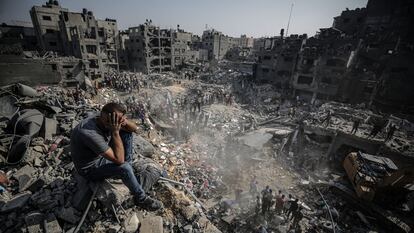War crimes in Gaza: What do experts say about Israel and Hamas?
EL PAÍS spoke to several leaders in the field, who argued that there must be no double standards when it comes to upholding human rights

The Hamas attacks against Israel on October 7 and the Israeli army’s bombings on Gaza have caused thousands of deaths, the forced transfer of the Palestinian population and vast destruction of the enclave. Hamas, which is considered a terrorist group by the European Union and the United States, is accused of war crimes for targeting civilians. And Israel is also facing accusations over its disproportionate response in Gaza, which has killed more than 10,000 people, according to the Gaza Health Ministry.
Israel is not a member of the International Criminal Court (ICC) and has ignored rulings from the U.N. International Court of Justice (ICJ), such as the 2004 ruling that declared Israel’s wall in the West Bank illegal.
U.N. Secretary General António Guterres condemned the Hamas attack on Israel, but pointed out that it “did not happen in a vacuum,” but after “56 years of suffocating occupation.” Since Israel’s victory in the Six-Day War in 1956, Israel has occupied the Gaza Strip, the West Bank and East Jerusalem.
Shortly after Guterres’s address, Craig Mokhiber announced he was stepping down as the director of the New York office of the U.N. high commissioner for human rights, citing the U.N.’s “failure” to stop what he described as the “genocide” of the Palestinian population.
It is a complex scenario that has sparked much debate among international rights groups.
Alexis Deswaef, vice-president of the International Federation for Human Rights (FIDH), says that Israel has been condemned by the U.N. for its occupation of Palestine in more resolutions, but “doesn’t mind violating international laws because they have the support of the United States in the Security Council.”
Deswaef believes that a strong response is needed by the ICC. In 2021, the court opened a formal investigation into the crimes committed by both parties in Gaza, the West Bank and East Jerusalem from 2014. Although Israel is not a member of the ICC, the Prosecutor’s Office of this court has jurisdiction over crimes perpetrated by Israelis on Palestinian soil. This is because the United Nations recognized the Palestinian territories as an observer state of the organization in 2012. Three years later, Palestine became a full member of the court.
“The Prosecutor’s Office must immediately analyze the current disproportionate actions of the Israeli army, along with the crimes of Hamas. If not, Israel’s impunity will continue,” says Deswaef.
Liesbeth Zegveld, an expert in human rights and international criminal law, agrees that Israel “has always acted outside the law.” For this situation to change, “pressure from the Western world is needed because it has never been held accountable,” she says.
Differences with Ukraine
Zegveld maintains that the attack carried out by Hamas on October 7, in which 1,400 people were killed and more than 240 kidnapped, “is a war crime.” “Those who died were not military targets, but rather victims of an assault in the context of an armed conflict,” she explains.
But she believes Israel’s “indiscriminate and disproportionate” bombings in Gaza also constitute “war crimes.” Whether these crimes will be brought to trial is another matter.
“[ICC] Prosecutor Karim Khan says that all crimes will be prosecuted, but he doesn’t seem to take concrete measures. This is different to the rapid response in the case of Ukraine, so the politicization of what is happening in Gaza is clear and the ICC cannot disconnect from that reality,” she says.
Deswaf points out the danger of these double standards. “Last March, the ICC issued an arrest warrant against Russian President Vladimir Putin for war crimes, including the illegal deportation of Ukrainian minors. The same alacrity should be shown, for example, with respect to Palestinian children imprisoned by Israel preventively,” he says. “You cannot have double standards because impunity fuels the next crime.”
What’s more, unlike in Ukraine, in Gaza, investigators have no direct access to the territory, so they are unable to collect evidence of war crimes.
International law
Karim Khan visited the border between Egypt and Gaza on October 29 and recalled that the ICC has jurisdiction over crimes committed in Israeli territory by Palestinians or any other member country of the court, in reference to Hamas attacks. He also said that the Israeli army “has to comply with the laws of armed conflict.” “They need to demonstrate the proper application of the principles of distinction, precaution and of proportionality,” he added.
International human rights law protects people who do not participate in hostilities. It restricts the means and methods of war, and applies to all parties — including non-state entities like Hamas — regardless of who started the conflict or is responsible. It is contained in the four Geneva Conventions of 1949, which were completed with the additional protocols of 1977, relating to the protection of victims of armed conflicts. Israel is a party to the Conventions and must safeguard civilians, treat them humanely, allow them to lead a normal life in the occupied territory, and guarantee the rights of the Palestinian population. It cannot, for example, destroy Palestinian property in Gaza or the West Bank “except where such destruction is rendered absolutely necessary by military operations,” according to Article 53 of the IV Geneva Convention.

Rights violations
“With the occupation, Israel is also responsible for the violation of the Palestinian people’s right to self-determination,” adds Asier Garrido Muñoz, a professor of Public International Law and European Union Law at The Hague University of Applied Sciences. This is in addition to the other human rights violations that may have been committed during the blockade.
But Garrido Muñoz believes blaming these rights violations on Israel will be difficult, “because it will be argued that the Palestinians in Gaza voted for Hamas to govern them.” However, he stresses that there is “a wealth of material” on the impact of the blockade on Gaza.
Blockades are not per se prohibited by international law, but they are if the population lacks access to food, medicine or basic necessities. “The blockading state must allow the passage of people or adequate material,” explains Garrido Muñoz, a former ICC lawyer. “This is surely the most difficult conflict in the world, which raises the most difficult questions, but that does not mean there are no answers.”
Hamas and Israel have clashed intermittently over the past two decades, but the attack launched last October 7 by Hamas was unprecedented. International humanitarian law does not prevent Israeli from responding, but it must act proportionally. For this reason, the experts point to the airstrikes on the Al-Shifa hospital and Jabaliya refugee camp, in addition to the forced displacement of Gazans towards the south amid bombings, as possible war crimes.
Zegveld is concerned that Palestinians tried in Israel will not have the same rights as Israeli citizens: “It is a discriminatory and racist system, although I doubt that Israel sees it in the same light as we do. For Israel, all Palestinians are Hamas. It’s one enemy.”
Alexis Deswaef regrets that Israel “plays on Europe’s bad conscience about the Holocaust and presents itself as the victim.” He adds: “Dangerous comparisons of this kind should not be made to justify an unacceptable war in Gaza.”
Garrido Muñoz, finally, points out that the solution to the conflict must also come from the Israelis, with the people “voting for leaders with a different vision.” He believes the moderates in the country are being “silenced by fanaticism.”
Sign up for our weekly newsletter to get more English-language news coverage from EL PAÍS USA Edition
Tu suscripción se está usando en otro dispositivo
¿Quieres añadir otro usuario a tu suscripción?
Si continúas leyendo en este dispositivo, no se podrá leer en el otro.
FlechaTu suscripción se está usando en otro dispositivo y solo puedes acceder a EL PAÍS desde un dispositivo a la vez.
Si quieres compartir tu cuenta, cambia tu suscripción a la modalidad Premium, así podrás añadir otro usuario. Cada uno accederá con su propia cuenta de email, lo que os permitirá personalizar vuestra experiencia en EL PAÍS.
¿Tienes una suscripción de empresa? Accede aquí para contratar más cuentas.
En el caso de no saber quién está usando tu cuenta, te recomendamos cambiar tu contraseña aquí.
Si decides continuar compartiendo tu cuenta, este mensaje se mostrará en tu dispositivo y en el de la otra persona que está usando tu cuenta de forma indefinida, afectando a tu experiencia de lectura. Puedes consultar aquí los términos y condiciones de la suscripción digital.








































